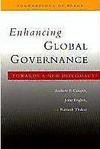
Enhancing Global Governance: Towards a New Diplomacy? PDF
320 Pages·2002·60.656 MB·English
Most books are stored in the elastic cloud where traffic is expensive. For this reason, we have a limit on daily download.
Preview Enhancing Global Governance: Towards a New Diplomacy?
Description:
This volume analyses the means by which global governance had been promoted by innovative diplomatic practices. The impetus for a new diplomacy has emerged not from traditional channels, but through a series of cross-cutting coalitions among like-minded states and civil society. The question of how these alternative leadership forms have been expressed through the United Nations system, together with an evaluation of the impact they have achieved, provides the fundamental theme of this text. Following an overview of the frustrations concerning the nature of leadership from the UN Security Council, experts look at the manner in which innovative diplomatic practices played out in two significant case studies: the development of the Ottawa Treaty to ban anti-personnel landmines and the campaign to establish an international court. The book then reviews the application of new diplomacy approaches particularly in the application of codes of conduct that would affect both states and global business, and then in selected areas of the expanded security agenda, including child soldiers and the exportation of diamonds from areas of conflict.
See more
The list of books you might like
Most books are stored in the elastic cloud where traffic is expensive. For this reason, we have a limit on daily download.
